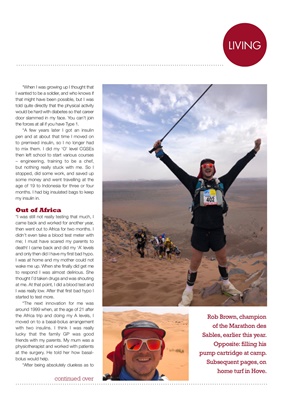
KITLIVING
continued over
"When I was growing up I thought that
I wanted to be a soldier, and who knows if
that might have been possible, but I was
told quite directly that the physical activity
would be hard with diabetes so that career
door slammed in my face. You can't join
the forces at all if you have Type 1.
"A few years later I got an insulin
pen and at about that time I moved on
to premixed insulin, so I no longer had
to mix them. I did my 'O' level CGSEs
then left school to start various courses
- engineering, training to be a chef,
but nothing really stuck with me. So I
stopped, did some work, and saved up
some money and went travelling at the
age of 19 to Indonesia for three or four
months. I had big insulated bags to keep
my insulin in.
Out of Africa
"I was still not really testing that much, I
came back and worked for another year,
then went out to Africa for two months. I
didn't even take a blood test meter with
me; I must have scared my parents to
death! I came back and did my 'A' levels
and only then did I have my first bad hypo.
I was at home and my mother could not
wake me up. When she finally did get me
to respond I was almost delirious. She
thought I'd taken drugs and was shouting
at me. At that point, I did a blood test and
I was really low. After that first bad hypo I
started to test more.
"The next innovation for me was
around 1999 when, at the age of 21 after
the Africa trip and doing my A levels, I
moved on to a basal-bolus arrangement
with two insulins. I think I was really
lucky that the family GP was good
friends with my parents. My mum was a
physiotherapist and worked with patients
at the surgery. He told her how basalbolus would help.
"After being absolutely clueless as to
Rob Brown, champion
of the Marathon des
Sables, earlier this year.
Opposite: filling his
pump cartridge at camp.
Subsequent pages, on
home turf in Hove.